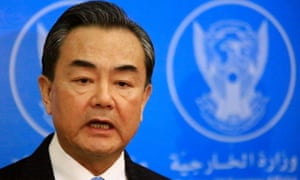China denies building empire in Africa
Foreign minister Wang Yi says Beijing won’t copy ‘western colonialists’ amid claims it exploits African resources for its own economic growth
China has adamantly denied the oft-repeated charge that it is building an empire in Africa just as the European powers did in the late 19th century.
Beijing is Africa’s biggest trade partner and has frequently been accused of an ethically deaf “resource colonialism” – extracting the continent’s mineral wealth at knockdown prices to propel its economic growth.
But foreign minister Wang Yi, on a five-nation tour of Africa, insisted: “Politically, we always speak up for African countries and uphold justice. Economically, we help African countries to enhance development to achieve prosperity.
“In China’s exchanges and cooperation with Africa, we want to see mutual benefit and win-win results. I want to make clear one point, that is, China will never follow the track of western colonists and all cooperation with Africa will never come at the expense of the ecology, environment or long-term interests of Africa.”
The comments were made to Chinese Central Television while Wang was in Kenya, where he met President Uhuru Kenyatta on Saturday. Chinese firms are carrying out a $653m (£430m) expansion of the main airport in the capital, Nairobi.
China’s rivalry with the west on the African stage has been much debated, but it is rare for one side to draw comparison so publicly. Last year, at the biggest gathering of African leaders ever held in Washington, US president Barack Obama said pointedly, “We don’t look to Africa simply for its natural resources,” but declined to mention China by name.
Only in a diplomatic cable, published via WikiLeaks in 2010 and not intended for public consumption, did a US official admit: “China is a very aggressive and pernicious economic competitor with no morals. China is not in Africa for altruistic reasons. China is in Africa for China primarily.”
Previously, Beijing has said its cooperation with African nations ranges across agriculture, health and infrastructure-related projects from schools to stadiums. The $200m headquarters of the Africa Union in Addis Ababa was a present and a “symbol of deepening relations”.
China maintains that more than half its foreign aid – more than $14bn between 2010 and 2012 – goes to Africa. It says the support comes with no strings attached and that it will never interfere in countries’ domestic affairs. But by default, critics argue, this means it effectively shores up the rule of Angola’s José Eduardo dos Santos, Sudan’s Omar al-Bashir and Zimbabwe’s Robert Mugabe, three of Africa’s most tenaciously authoritarian rulers.
Last month, however, Beijing announced that it will send 700 combat troops to join the UN peacekeeping mission in South Sudan, signalling an unusually robust intervention. Speaking to reporters in Sudan on Sunday, Wang defended China’s mediation efforts in South Sudan, rejecting the claim that it was acting out of self-interest after investing heavily in oil.
“China’s mediation of South Sudan issues is completely the responsibility and duty of a responsible power, and not because of China’s own interests,” the minister said.
Wang’s itinerary spans Kenya, Cameroon, Equatorial Guinea, Sudan and the Democratic Republic of the Congo.

No comments:
Post a Comment
Comments always welcome!